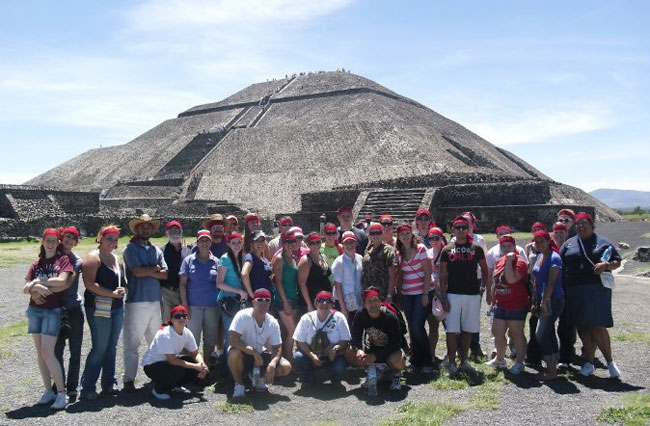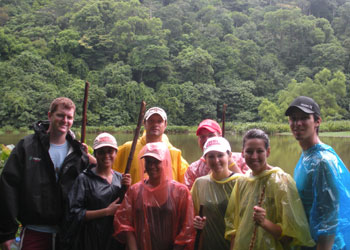Field School Offers Cultural Immersion
Jan. 4, 2011
SHSU Media Contact: Meredith Mohr

With the jungle spread out behind them, a group of eight Sam Houston State University students stop to pose for a picture before heading deeper into the rainforest. Clad in brightly colored ponchos to keep out the warm rain, they visit eco-tourism sites run by marginalized communities in the state of Veracruz, Mexico.
“Because of a family connection I have with the Region de los Tuxtlas, in the state of Veracruz, I was able to take some of my students from my international finance and economics and business management students on a side trip to two different communities, Lopez Mateos and Miguel Hidalgo,” said SHSU economics and international business professor Ulyses Balderas, who led the trip.
"The goal of the trip was to show students how individuals from low income communities have developed sustainable economic activities aimed to reduce some of the social problems present in the region such as environmental destruction and poverty," he said. "This is the case of ecotourism in San Andres Tuxtla, Veracruz, where natives have developed an ecotourism network that has made life better for many."
This scene isn’t typical for foreign exchange student programs, SHSU’s Puebla Field School director Frieda Koeninger noted. But thanks to the business background of Balderas, business students in the Puebla Field School can go to Mexico to see these eco-tourism sites, applying what they learn in an environment other than a classroom.
That independent application of knowledge from the classroom to the real world is what sets SHSU’s foreign exchange program apart from other programs, according to Koeninger.
The fourth largest city in Mexico, Puebla is located in a high altitude with a cool climate a city rich with history. The culture of Puebla is a blend of colonial architecture and traditional art forms with a modern business and industrial sector.
 |
| "International Finance and Economics" and "Business Management" students visited eco-tourism sites in Veracruz, Mexico, as part of the Puebla Field School last summer. |
“The program is not a tour like some of the other programs,” Koeninger said. “Students are put into the real, everyday life and experience complete immersion in the language and culture, especially if they stay with a local family. They are encouraged to go out on their own and experience the country for themselves.
“It’s really more beneficial in the end, because they learn independence, and from that independence comes confidence in the language and themselves.”
Through the program, students have the opportunity to take seven different courses in history, Spanish or finance, and have the option to live with a host family or at a hotel in downtown Puebla while attending classes at Universidad Iberoamericana.
“It’s a very cultural experience,” Koeninger said. “We encourage students to stay with a family. The families consider themselves ambassadors to their culture, but they are also like surrogate parents. They include students in their family activities and welcome them into their home as if they were their own child.”
Koeninger emphasized that although the field school is more about the experience as a whole, and not just about taking classes, the academic aspect of studying abroad with SHSU has several advantages.
“Classes are taught by SHSU professors and this makes the program academically rigorous. It also creates a support system between the students and their teachers,” Koeninger said. “It is not like other programs, and because of that, I think students have a happier experience. They are really learning the language, making valuable contacts and real friendships with international students as well as their own classmates. The goal is to teach them the language but also how to be independently successful.”
Students have talked about how being a part of the field school has made a difference in their academic experience at Sam Houston State University. Business student Christina Samson studied abroad in Puebla last summer, an experience she describes as the time of her life.
“I can’t even pick a favorite experience – from the trips we took, to spending time with my host family, to the friendships I made,” Samson said. “I found a great friend at Sam Houston whom I will be friends with for a lifetime. I recommend the program to all students, especially those open to new experiences and adventure.”
The 2011 program will offer business, Spanish and history courses during the first summer session, including FIN 430/FIN 575: "International Finance and Trade;" GBA 430/GBA 575: "International Business Management;" SPN 263: "Intermediate Spanish;" SPN 369: "Conversational Spanish II;" SPN 376: "The Mexican Short Story;" HIS 399W: "Colonial Mexico;" and HIS 399W: "Modern Mexico."
Students interested in participating can attend an informational meeting on Feb. 9, at 3:30 p.m. in Academic Building IV Room 335.
For more information on the Puebla Field School program, contact Koeninger at 936.294.1443 or at FOL_FCK@shsu.edu.
- END -
This page maintained by SHSU's Communications Office
Director: Bruce Erickson
Assistant Director: Julia May
Writer: Jennifer Gauntt
Located in the 115 Administration Building
Telephone: 936.294.1836; Fax: 936.294.1834
Please send comments, corrections, news tips to Today@Sam.edu.

 SamWeb
SamWeb My Sam
My Sam E-mail
E-mail

